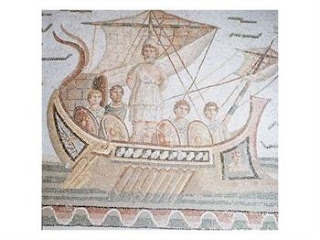English
 e like to imagine that cave men women were gross beasts, that is to say, totally different from us who incarnate modern “civilization”. This word “civilization” seems to define “our” Western and technologically developed way of life.
e like to imagine that cave men women were gross beasts, that is to say, totally different from us who incarnate modern “civilization”. This word “civilization” seems to define “our” Western and technologically developed way of life. This distinction is related in a certain way to our theme about the imagery of power, because we think that the “cavemen” walked around with big sticks, acquired their wives by dragging them by the hair, and generally, lacked delicate emotions. In short, they were beings who used force rather than intelligence.
Picture of archeological remains
taken from here.

Nevertheless, there is much evidence that prehistoric men and women were very like us and felt just as we do about things. For example, in Gobero, an archaeological excavation site of in the Sahara, the 5000 year-old bones of a woman have been found. She was buried on a bed of flowers and seems to have been embracing two small children. This reverence certainly shows both grief and tenderness.
In addition, if we are going to believe legend, our “civilized” ancestors distanced themselves from their own “primitive” predecessors and human contemporaries, just as we do. In the Odyssey, the bread-eaters and language-users defined themselves as cultured human beings; the others (and there were many of them) were considered despicable in one way or another.
In itself, this scorn is not the same thing as a power relationship, but it is an ideology that justifies acts of discrimination, depredation and mistreatment.
References:
1. Article on the archeological findings in Gobero: http://www.taiwannews.com.tw/etn/news_content.php?id=716529&lang=eng_news&cate_img=logo_world&cate_rss=WORLD_eng
2. Ornate letters: http://retrokat.com/medieval/leil.htm
Note: Internet languages are degenerating rapidly: terms that once referred a concept now make reference to rock groups or computer games. Try to look for “civilization”, “primitive man” or “cavemen”.
Español
 os gusta imaginar que los hombres y mujeres de las cavernas eran brutos, casi bestias, es decir, totalmente distintos a nosotros que somos los portadores de la “civilización”. Este vocablo “civilización” aparece como un término para describir “nuestra” manera de vivir, es decir la sociedad occidental y tecnológicamente “desarrollada”.
os gusta imaginar que los hombres y mujeres de las cavernas eran brutos, casi bestias, es decir, totalmente distintos a nosotros que somos los portadores de la “civilización”. Este vocablo “civilización” aparece como un término para describir “nuestra” manera de vivir, es decir la sociedad occidental y tecnológicamente “desarrollada”. Esta distinción se relaciona en cierto modo con nuestro tema del imaginario del poder porque consideramos que los “cavernícolas” andaban por el mundo con grandes garrotes, se apoderaban de sus parejas arrastrándolas por los cabellos y, en general, carecían de emociones delicadas. En fin, eran seres que usaban la fuerza más que la inteligencia.
Foto de restos arqueológicos
tomada de aquí.

Sin embargo, hay mucha evidencia que los hombres y mujeres prehistóricos nos parecían en muchos aspectos y sentían sentimientos iguales a los nuestros. Por ejemplo, en Gobero, un sitio de excavación arqueológico en el Sahara, han encontrado huesos de 5000 años de antigüedad de una mujer que fue enterrado sobre un lecho de flores abrazando a dos niños pequeños. El acto de enterrarlos con tanta reverencia ciertamente significa un alto grado de sensibilidad y ternura.
Pintura de Ulises pasando por
las Sirenas tomada de aquí.

Además, si vamos a creer a las leyendas, nuestros ante-pasados que se consideraban “civilizados” se distanciaban de sus propios predecesores humanos y contemporáneos “primitivos”, justo como hacemos nosotros. En la Odisea, comer pan y usar lenguaje definen a los seres humanos cultos; los demás seres (y había muchos de ellos) eran despreciables de una u otra manera.
En sí, este desprecio no trata de relaciones de poder, sino de una ideología que justifica actos de discriminación, depredación y maltrato.
Referencias:
1. Artículo sobre los hallazgos arequeológicos en Gobero : http://www.taiwannews.com.tw/etn/news_content.php?id=716529&lang=eng_news&cate_img=logo_world&cate_rss=WORLD_eng
2. Letras ornatas: http://retrokat.com/medieval/leil.htm
Nota: Los idiomas del Internet están en un proceso rápido de degeneración: términos que una vez referían a un concepto ahora hacen referencia a grupos de rock o juegos de video. Intenta buscar “civilización”, “primitive man” o “cave man”.

No hay comentarios:
Publicar un comentario